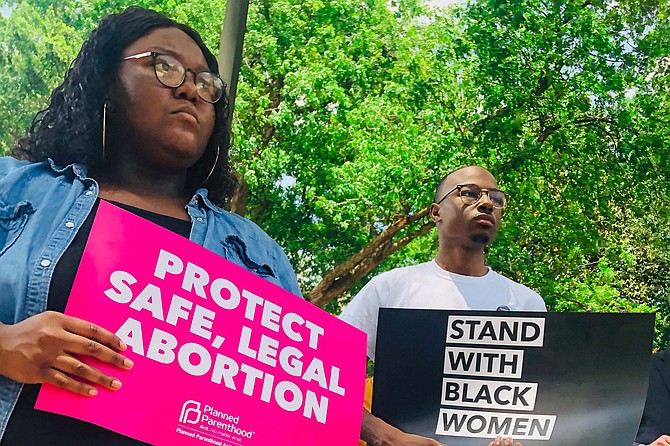Abortion-rights activists protested against Mississippi’s six-week abortion ban outside the Mississippi Capitol building in May 2019. Photo by Ashton Pittman
As a parade of angry white men stood at the podium on the Mississippi Capitol steps denouncing abortion one cold day in February, Libby Rich stood off to the side, dancing and using American sign language in front the crowd that had gathered below around a statue that honors the women of the Confederacy.
"You are such a bad person. God will never forgive you for this. You have no love. You have no compassion. You are anti-choice," Rich signed, as one man after another from Operation Save America made vitriolic remarks about women and "homosexuals."
In the 1960s, before the U.S. Supreme Court's 1973 Roe v. Wade ruling overturned state-level blanket abortion bans, Rich nearly died from an infection due to an illegal abortion that she sought in desperate circumstances. While in the hospital, she faced threats of possible arrest and prosecution once the doctors realized what she had done.
Even as they stood on the Capitol steps, the Mississippi Legislature was working on passing a law that bans all abortions once a fetal heartbeat becomes detectable, which is around six weeks' gestation. The Legislature passed that law in March, but a federal judge struck it down in May. The State appealed the ruling soon after.
'An Unbroken Line'
The case is making its way through U.S. federal courts alongside a 15-week abortion ban the Legislature passed in 2018, but which the same judge—Judge Carlton W. Reeves for the U.S. District Court for the Southern District of Mississippi—also struck down in November 2018. On Dec. 13, the 5th U.S. Circuit Court of Appeals in New Orleans concurred with Reeves' ruling on the 15-week ban.
"In an unbroken line dating to Roe v. Wade, the Supreme Court's abortion cases have established (and affirmed, and re-affirmed) a woman's right to choose an abortion before viability," a three-judge panel appointed by Democratic and Republican presidents ruled.
"States may regulate abortion procedures prior to viability so long as they do not impose an undue burden on the woman's right, but they may not ban abortions. The law at issue is a ban."
"Mississippi politicians have done everything in their power to cut off abortion access in our state. Despite these attempts, abortion remains legal in Mississippi, and our clinic is open," Shannon Brewer, the director of Mississippi's only abortion clinic, the Jackson Women's Health Organization, said after the ruling.
"But year after year, the State makes it harder to access abortion. Because of that, many of our patients drive hundreds of miles and spend weeks or months saving money to reach us—for abortion care, and for gas, a hotel and to cover childcare."
The Center for Reproductive Rights, which filed the lawsuit on JWHO's behalf, celebrated the ruling.
"With this ruling, Mississippi—and other states trying to put abortion out of reach—should finally get the message. Instead of wasting taxpayer dollars to defend multiple abortion bans that won't stand up in court, they should be working on other issues—like addressing the state's alarming maternal mortality rates," Hillary Schneller, the Center's senior attorney, said in a press statement on Dec. 13.
Bryant Vows Fight
The fight is far from over, though. Kelly Krause, the U.S. press officer for the Center for Reproductive Rights, told the Jackson Free Press on Dec. 13 that the court is set to hear arguments on Feb. 3, meaning a decision would likely come by summer. After the court struck down the 15-week ban, though, Mississippi Gov. Phil Bryant vowed that the State would not give up.
"Mississippi will continue this mission to the United States Supreme Court," Bryant, a Republican, tweeted.
Krause said the Center does not expect the Supreme Court to take the case. If that did happen, though, it could set the stage for a fight over Roe v. Wade—and raise the possibility that the nation's high court, which is now more conservative under Trump, could overturn the half-century-old precedent.
Earlier this year, Mississippi House Rep. Joey Fillingane, R-Sumrall, told the Jackson Free Press that part of the goal of bills like the heartbeat bill and the 15-week ban is to get a case to the Supreme Court.
"With a fifth conservative taking the seat of Justice Kennedy, who was considered a moderate on the court, I think a lot of people thought, finally, we have five conservative justices and so now would be a good time to start testing the limits of Roe," Fillingane said at the time.
Already, the U.S. Supreme Court has signaled that it may be more open to anti-abortion arguments since President Donald Trump appointed Brett Kavanaugh to replace Justice Anthony Kennedy, a swing vote who stopped the court from overturning Roe v. Wade in 1992.
'We Are Worried'
In the past, federal courts have struck down laws requiring women seeking abortion care to undergo invasive transvaginal ultrasounds. In early December, though, the U.S. Supreme Court allowed an appeals court's ruling to stand, and after that courts upheld a Kentucky transvaginal ultrasound law. The Kentucky law, now in effect, requires doctors to vaginally probe women to conduct the ultrasound, play the sound of the fetal heartbeat and describe images of the fetus in detail.
In early 2020, the U.S. Supreme Court will hear a case on a Louisiana "admitting privileges" law that imposes burdensome regulations on abortion clinics, and would likely shut down all but one clinic in Mississippi's sister State if allowed to take effect. The law requires doctors who provide abortions to obtain admitting privileges at local hospitals, which can prove difficult if not impossible in some cases.
Federal courts have previously blocked admitting privileges laws, too, including one the Mississippi Legislature passed in 2012 that would have forced JWHO, the only clinic in the state, to close. If the U.S. Supreme Court upholds the Louisiana law, that would grant Mississippi legislators permission to pass a new admitting-privileges law, free of fears of judicial reprisal.
After Reeves struck down the six-week ban in May, Brewer told the Jackson Free Press that she is worried about how these cases could affect Roe v. Wade.
"We know this is going on in multiple states, so of course we are worried, but of course we are going to fight whatever they try to put out there," she said.
Follow Jackson Free Press State Reporter Ashton Pittman on Twitter @ashtonpittman. Send tips to [email protected]. Read more abortion coverage at jfp.ms/abortion.
More stories by this author
- Governor Attempts to Ban Mississippi Abortions, Citing Need to Preserve PPE
- Rep. Palazzo: Rural Hospitals ‘On Brink’ of ‘Collapse,’ Need Relief Amid Pandemic
- Two Mississippi Congressmen Skip Vote on COVID-19 Emergency Response Bill
- 'Do Not Go to Church': Three Forrest County Coronavirus Cases Bring Warnings
- 'An Abortion Desert': Mississippi Women May Feel Effect of Louisiana Case





Comments
Use the comment form below to begin a discussion about this content.
comments powered by Disqus